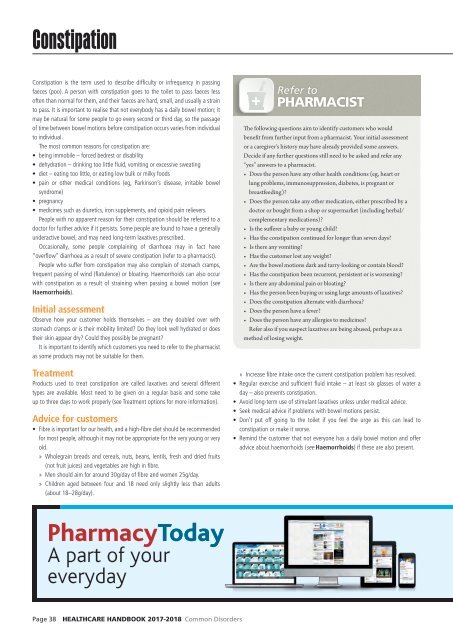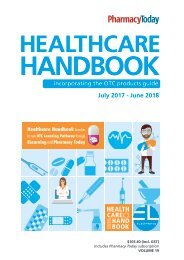2017 HCHB_digital
Create successful ePaper yourself
Turn your PDF publications into a flip-book with our unique Google optimized e-Paper software.
Constipation<br />
Constipation is the term used to describe difficulty or infrequency in passing<br />
faeces (poo). A person with constipation goes to the toilet to pass faeces less<br />
often than normal for them, and their faeces are hard, small, and usually a strain<br />
to pass. It is important to realise that not everybody has a daily bowel motion; it<br />
may be natural for some people to go every second or third day, so the passage<br />
of time between bowel motions before constipation occurs varies from individual<br />
to individual.<br />
The most common reasons for constipation are:<br />
• being immobile – forced bedrest or disability<br />
• dehydration – drinking too little fluid, vomiting or excessive sweating<br />
• diet – eating too little, or eating low bulk or milky foods<br />
• pain or other medical conditions (eg, Parkinson’s disease, irritable bowel<br />
syndrome)<br />
• pregnancy<br />
• medicines such as diuretics, iron supplements, and opioid pain relievers.<br />
People with no apparent reason for their constipation should be referred to a<br />
doctor for further advice if it persists. Some people are found to have a generally<br />
underactive bowel, and may need long-term laxatives prescribed.<br />
Occasionally, some people complaining of diarrhoea may in fact have<br />
“overflow” diarrhoea as a result of severe constipation (refer to a pharmacist).<br />
People who suffer from constipation may also complain of stomach cramps,<br />
frequent passing of wind (flatulence) or bloating. Haemorrhoids can also occur<br />
with constipation as a result of straining when passing a bowel motion (see<br />
Haemorrhoids).<br />
Initial assessment<br />
Observe how your customer holds themselves – are they doubled over with<br />
stomach cramps or is their mobility limited? Do they look well hydrated or does<br />
their skin appear dry? Could they possibly be pregnant?<br />
It is important to identify which customers you need to refer to the pharmacist<br />
as some products may not be suitable for them.<br />
Treatment<br />
Products used to treat constipation are called laxatives and several different<br />
types are available. Most need to be given on a regular basis and some take<br />
up to three days to work properly (see Treatment options for more information).<br />
Advice for customers<br />
• Fibre is important for our health, and a high-fibre diet should be recommended<br />
for most people, although it may not be appropriate for the very young or very<br />
old.<br />
»»<br />
Wholegrain breads and cereals, nuts, beans, lentils, fresh and dried fruits<br />
(not fruit juices) and vegetables are high in fibre.<br />
»»<br />
Men should aim for around 30g/day of fibre and women 25g/day.<br />
»»<br />
Children aged between four and 18 need only slightly less than adults<br />
(about 18–28g/day).<br />
Refer to<br />
PHARMACIST<br />
The following questions aim to identify customers who would<br />
benefit from further input from a pharmacist. Your initial assessment<br />
or a caregiver's history may have already provided some answers.<br />
Decide if any further questions still need to be asked and refer any<br />
“yes” answers to a pharmacist.<br />
• Does the person have any other health conditions (eg, heart or<br />
lung problems, immunosuppression, diabetes, is pregnant or<br />
breastfeeding)?<br />
• Does the person take any other medication, either prescribed by a<br />
doctor or bought from a shop or supermarket (including herbal/<br />
complementary medications)?<br />
• Is the sufferer a baby or young child?<br />
• Has the constipation continued for longer than seven days?<br />
• Is there any vomiting?<br />
• Has the customer lost any weight?<br />
• Are the bowel motions dark and tarry-looking or contain blood?<br />
• Has the constipation been recurrent, persistent or is worsening?<br />
• Is there any abdominal pain or bloating?<br />
• Has the person been buying or using large amounts of laxatives?<br />
• Does the constipation alternate with diarrhoea?<br />
• Does the person have a fever?<br />
• Does the person have any allergies to medicines?<br />
Refer also if you suspect laxatives are being abused, perhaps as a<br />
method of losing weight.<br />
»»<br />
Increase fibre intake once the current constipation problem has resolved.<br />
• Regular exercise and sufficient fluid intake – at least six glasses of water a<br />
day – also prevents constipation.<br />
• Avoid long-term use of stimulant laxatives unless under medical advice.<br />
• Seek medical advice if problems with bowel motions persist.<br />
• Don’t put off going to the toilet if you feel the urge as this can lead to<br />
constipation or make it worse.<br />
• Remind the customer that not everyone has a daily bowel motion and offer<br />
advice about haemorrhoids (see Haemorrhoids) if these are also present.<br />
PharmacyToday<br />
A part of your<br />
everyday<br />
Page 38 HEALTHCARE HANDBOOK <strong>2017</strong>-2018 Common Disorders



